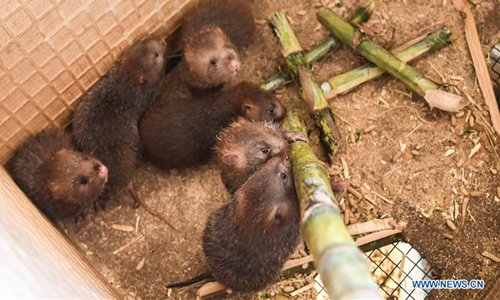
Photo taken on July 24, 2019 shows bamboo rats bred by Lin Jinghong in Qinzhou City, south China's Guangxi Zhuang Autonomous Region. The breeding of bamboo rats, which have high economic value, helps Lin's family get out of poverty. Lin's annual income has reached 100,000 yuan (14,552 U.S. dollars) in recent years. (Xinhua/Zhang Ailin)
None of the 140,000 Chinese wildlife farmers in poverty-stricken households returned to poverty after a national ban on illegal wildlife trade went into force in February 2020, the National Forestry and Grassland Administration said on Tuesday.
Following the ban, the livelihoods of wildlife farmers became a public concern after many had their animals seized or killed and farms were completely disinfected when the host of the coronavirus was suspected to be a wild land animal.
Li Chunliang, deputy chief of the administration, told media on Tuesday that none of the 140,000 poor wildlife farmers in China returned to poverty due to the ban, thanks to governments' compensation and assistance packages.
Some 24 provincial-level regions have completed distribution of compensation while 90 percent of the work has been done nationwide. Local authorities helped wildlife farmers change to other industries such as raising permitted species or livestock, according to Li.
Governments also helped the farmers match with companies that are qualified to run regulated businesses, Li said. Before the February ban, sales of wildlife were less regulated, creating space for illegal trade.
For those who left the industry, governments provided training programs and career services to help them adapt to a new industry as soon as possible.
The February ban, issued during a bimonthly session of the Standing Committee of the National People's Congress, China's top legislature, was seen by many observers as an amendment to China's Law on Wild Animal Protection that only stipulated protection charters on protected species, not commercially used species.
Global Times




